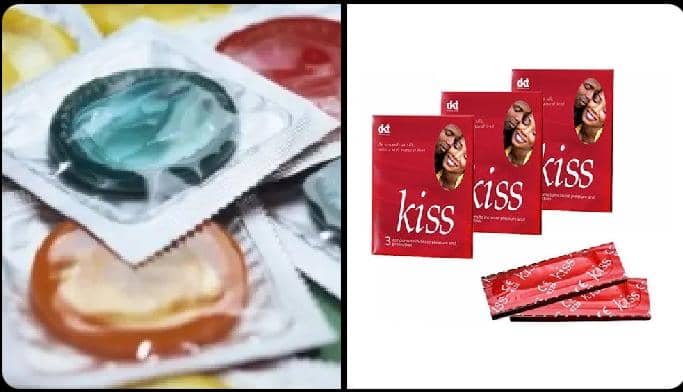On December 18, 2023, a 51-year-old trader named Walter Okafor was arrested and brought before an Ikeja Magistrates’ Court in Lagos State, Nigeria, for allegedly manufacturing and selling fake condoms packaged as “Kiss condoms.” The prosecution, led by Inspector Samuel Mishozunnu, accused Okafor of orchestrating a scheme to forge the branding of Kiss condoms, a product owned by TK2 International Nigeria Limited, a reputable company in the healthcare and pharmaceutical sector. The charges stem from activities that reportedly took place in the bustling Idumota market, a commercial hub known for its wholesale and retail trade.
According to the prosecution, Okafor conspired with others, who remain at large, to produce counterfeit condom packaging that mimicked the authentic Kiss condoms’ design, logo, and trademarks. The fake products were allegedly sold to unsuspecting consumers, posing significant health risks due to their substandard quality and lack of regulatory approval from the National Agency for Food and Drug Administration and Control (NAFDAC). The prosecution emphasized that Okafor’s actions violated Section 411 of the Criminal Law of Lagos State, 2015, which addresses conspiracy, and Section 1(1)(c) of the Counterfeit and Fake Drugs and Unwholesome Processed Foods (Miscellaneous Provisions) Act, Cap. C34, Laws of the Federation of Nigeria, 2004.
The case came to light following a complaint lodged by TK2 International Nigeria Limited, which noticed an influx of counterfeit Kiss condoms in the Lagos market. The company’s investigation, supported by law enforcement, traced the fake products to Okafor’s operations in Idumota. During a raid conducted by the police, several packs of the counterfeit condoms, along with packaging materials bearing the forged Kiss condoms logo, were recovered from Okafor’s shop, serving as key evidence in the case.
In court, Okafor pleaded not guilty to the two-count charge of conspiracy and forgery. His defense counsel, Mr. James Ogunleye, applied for bail, arguing that the accused was a first-time offender with no prior criminal record and was willing to cooperate with the investigation. The counsel further assured the court that Okafor, a resident of Lagos with a fixed address, would not abscond if granted bail.
The presiding magistrate, Mrs. M. O. Oshin, granted Okafor bail in the sum of N500,000 with two sureties in like sum. The sureties were required to provide evidence of tax payments to the Lagos State Government for three years and proof of residence within the court’s jurisdiction. Additionally, the magistrate ordered that Okafor be remanded in the Kirikiri Correctional Centre pending the perfection of his bail conditions.
The court adjourned the case until February 20, 2024, for further hearing, allowing both the prosecution and defense to prepare their arguments. The prosecution indicated its intention to call witnesses, including representatives from TK2 International Nigeria Limited and NAFDAC officials, to testify on the dangers posed by the counterfeit condoms. The defense, meanwhile, hinted at challenging the authenticity of the evidence and the circumstances surrounding Okafor’s arrest.
This case highlights the ongoing challenge of counterfeit products in Nigeria’s markets, particularly in the healthcare sector, where fake drugs and medical devices can have life-threatening consequences. NAFDAC has repeatedly warned consumers to purchase condoms and other health-related products from verified sources to avoid falling victim to counterfeiters. The agency has also intensified its crackdown on illegal manufacturers and distributors, with several arrests made across the country in recent years.
Public health experts have expressed concern over the proliferation of fake condoms, noting that they often fail to meet safety standards, increasing the risk of unintended pregnancies and sexually transmitted infections, including HIV/AIDS. The Kiss condom brand, known for its affordability and reliability, has been a target for counterfeiters due to its popularity among Nigerian consumers. TK2 International Nigeria Limited has vowed to pursue legal action against all parties involved in the counterfeiting of its products to protect its brand and ensure consumer safety.
Okafor’s case has drawn attention to the need for stricter enforcement of intellectual property laws and enhanced collaboration between regulatory agencies, law enforcement, and private companies. Market associations in Idumota have also been urged to monitor the activities of traders to prevent the sale of counterfeit goods. As the case progresses, it is expected to set a precedent for addressing similar offenses in Nigeria’s commercial landscape.
The outcome of this trial could have far-reaching implications for Okafor, who faces potential imprisonment if convicted. For now, he remains in custody, awaiting the fulfillment of his bail conditions, while the public awaits further developments in this high-profile case. The Lagos State Police Command has assured residents of its commitment to tackling economic crimes, including the production and sale of counterfeit goods, to safeguard public health and maintain trust in the market.


